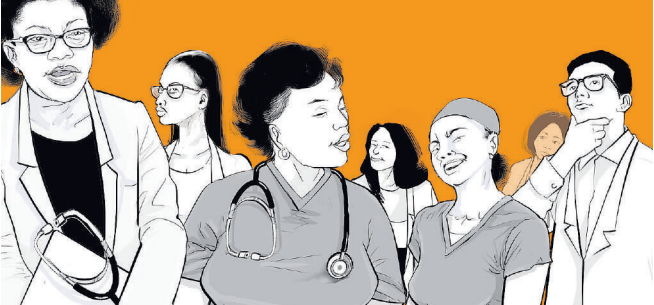
 THE STAR ILLUSTRATION
THE STAR ILLUSTRATION
Africa's future is not written in its mineral wealth or natural resources. It is not locked away in foreign aid or the goodwill of global health donors.
Africa’s future is in its people—its women, its youth, its untapped brilliance. And yet, we refuse to see it. We stand at a defining moment.
WHO predicts a shortage of 6.1 million healthcare workers in sub-Saharan Africa by 2030—a staggering gap that could cripple efforts to achieve universal health coverage.
But here’s the irony: one in three trained healthcare workers in the region is unemployed. This is not a skills shortage; it is a leadership failure.
The McKinsey report, ‘Overcoming sub-Saharan Africa’s health workforce paradox’, lays bare this contradiction. It details how governments are failing to employ the very workforce needed to fill the healthcare gap.
The paradox is clear: even as our hospitals are overburdened, millions of trained health workers sit idle, waiting for an opportunity that never comes.
Africa is not lacking in talent. It is lacking the courage to invest in it. Women are the backbone of healthcare in Africa.
They make up 70 per cent of the health workforce globally, yet in leadership roles, only 25 per cent belong to them.
In community healthcare, the numbers are even worse: in sub-Saharan Africa, 70 per cent of community health workers are women, but only 23 per cent receive a stipend for their work.
The rest serve for free. This is not just an injustice; it is an economic disaster. Imagine if we fully paid, fully trained and fully empowered the women who are already keeping Africa’s communities healthy.
Imagine if we gave them real leadership positions instead of empty recognition. The McKinsey report estimates that closing Africa’s health workforce gap could reduce disease burden by 35 per cent and inject $22 billion (Sh2.8 trillion) into GDP annually.
That is the power of investing in people. The global north talks about empowering women in Africa. We do not need empowerment.
We need salaries, respect and the seats at the decision-making table that we have already earned. When will we stop celebrating women’s contributions and start compensating them? Africa’s median age is just 19.7 years—the youngest continent.
By 2050, nearly one in three young people on Earth will be African. And yet, the leadership still talks about the youth as a future asset, a someday resource. Africa’s youth is not the future workforce—it is the workforce.
They are already innovating, leading and filling the gaps where governments have failed. During Covid-19, young entrepreneurs created telemedicine platforms, AI-driven diagnostics and mobile health apps that revolutionised care.
But instead of harnessing this talent, governments continue to focus on top-down solutions that ignore the workforce right in front of them.
The McKinsey report highlights how digital training and entrepreneurship could be game-changers in healthcare.
Countries like Rwanda, Nigeria and South Africa have begun integrating AI into medical training, allowing young healthcare workers to learn and scale rapidly.
These models should not be experimental; they should be standard. If we want to solve Africa’s health workforce crisis, the answer is simple: fund the youth.
Invest in digital health. Expand training access. Stop hoarding resources at the top and start giving young professionals the opportunities they have already earned.
At the Pan-Africa Surgical Congress in Kigali, the same reality echoed through every session: Africa cannot continue outsourcing its leadership.
But here’s the real question: Is Africa really lacking workers? Or are we simply failing to employ them? The McKinsey report suggests that filling just half of the 6.1 million healthcare worker shortfall would require an investment of $120.4 billion over eight years—less than two per cent of Africa’s GDP.
The money exists. The workforce exists. The need exists. The only thing missing is the will to act. UHC will not be achieved by endless policy discussions in air-conditioned conference rooms.
It will be achieved when women in healthcare are paid what they deserve, youth-led health innovations are fully funded and trained healthcare workers are actually hired.
Africa is the sleeping giant of global healthcare. It is time to wake up. The challenge is not resources—it is priorities.
The question is not whether we can afford to invest in our people. The question is whether we can afford not to.
The world is watching. The future is waiting. Africa, what will we choose?
Nicholas Okumu is a Surgeon, writer and advocate
of healthcare reform and leadership in Africa









![[PHOTOS] Gachagua warm reception in Nyandarua](/_next/image?url=https%3A%2F%2Fcdn.radioafrica.digital%2Fimage%2F2025%2F04%2Fc2a8c64d-5577-4768-a0ac-513c8876c288.jpeg&w=3840&q=100)


